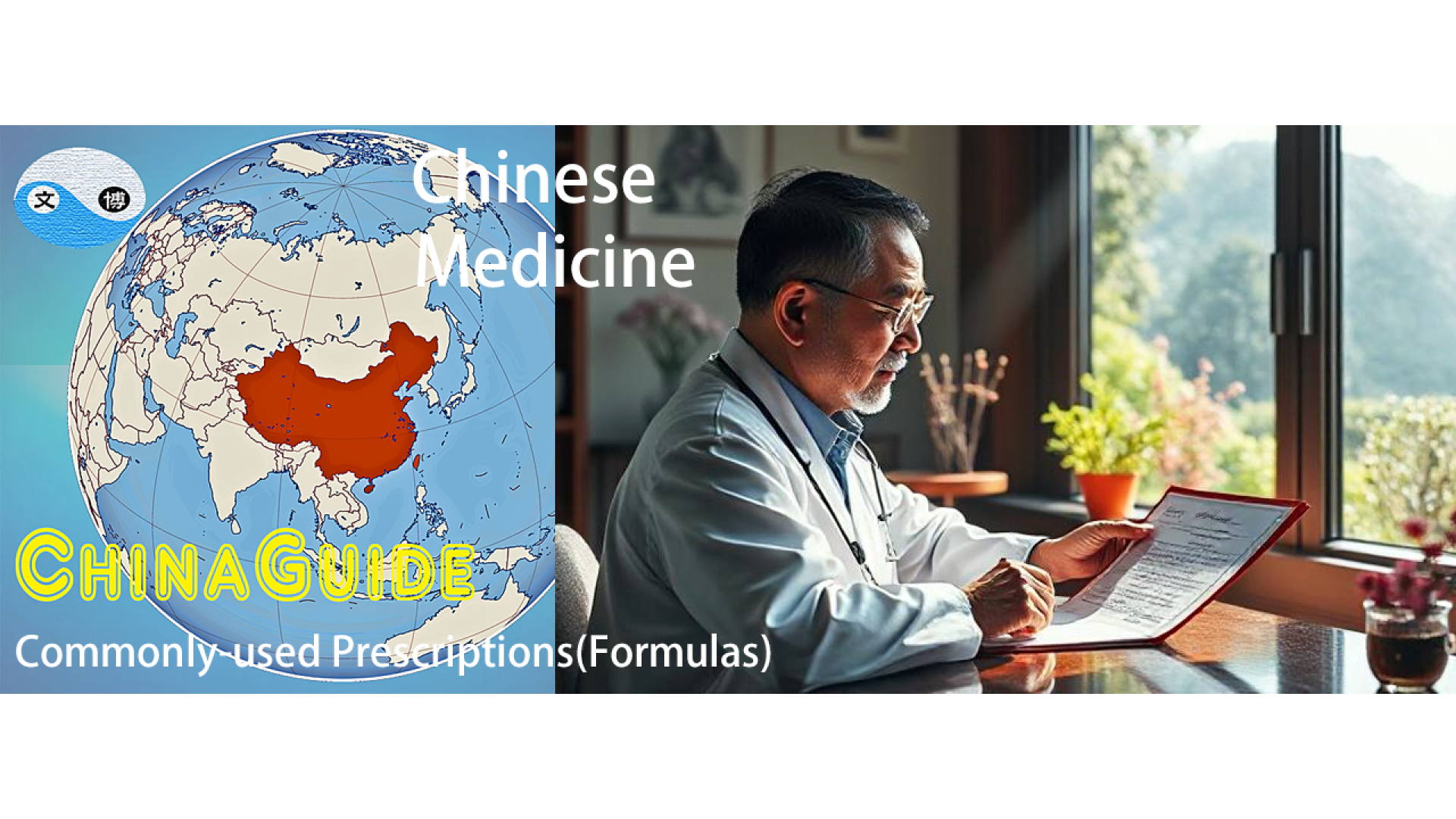There are roughly 13,000 medicinal substances used in China and over 100,000 medicinal prescriptions recorded in the ancient literature. Plant elements and extracts are the most common elements used in medicines.
Here is a list of commonly-used Traditional Chinese Medicine (TCM) prescriptions, organized by their Chinese names, pinyin, key ingredients (where notable), and primary indications. These formulas are often tailored to individual patterns, so professional consultation is advised.
1. 小柴胡汤 (Xiǎo Chái Hú Tāng) – Minor Bupleurum Decoction
Ingredients: Bupleurum (Chái Hú), Scutellaria (Huáng Qín), Ginseng (Rén Shēn), etc.
Uses: Harmonizes internal/external conditions; treats alternating fever/chills, chest discomfort, and mild infections.
2. 桂枝汤 (Guì Zhī Tāng) – Cinnamon Twig Decoction
Ingredients: Cinnamon (Guì Zhī), Peony (Bái Sháo), Ginger (Shēng Jiāng).
Uses: Releases exterior wind-cold; addresses early-stage colds with sweating.
3. 四君子汤 (Sì Jūn Zǐ Tāng) – Four Gentlemen Decoction
Ingredients: Ginseng (Rén Shēn), Atractylodes (Bái Zhú), Poria (Fú Líng), Licorice (Gān Cǎo).
Uses: Tonifies spleen qi; treats fatigue, poor digestion, and weak appetite.
4. 六味地黄丸 (Liù Wèi Dì Huáng Wán) – Six-Ingredient Rehmannia Pill
Ingredients: Rehmannia (Shēng Dì Huáng), Cornus (Shān Zhū Yú), Dioscorea (Shān Yào).
Uses: Nourishes kidney yin; for dizziness, tinnitus, and night sweats.
5. 补中益气汤 (Bǔ Zhōng Yì Qì Tāng) – Tonify the Middle and Augment Qi Decoction
Ingredients: Astragalus (Huáng Qí), Ginseng (Rén Shēn), Licorice (Gān Cǎo).
Uses: Lifts sinking spleen qi; addresses prolapse, chronic diarrhea, or fatigue.
6. 逍遥散 (Xiāo Yáo Sǎn) – Free and Easy Wanderer Powder
Ingredients: Bupleurum (Chái Hú), Peony (Bái Sháo), Atractylodes (Bái Zhú).
Uses: Soothes liver qi stagnation; for stress, menstrual irregularities, or bloating.
7. 银翘散 (Yín Qiào Sǎn) – Honeysuckle and Forsythia Powder
Ingredients: Honeysuckle (Jīn Yín Huā), Forsythia (Lián Qiào), Mint (Bò He).
Uses: Clears wind-heat; treats sore throat, fever, and early-stage viral infections.
8. 龙胆泻肝汤 (Lóng Dǎn Xiè Gān Tāng) – Gentiana Drain the Liver Decoction
Ingredients: Gentiana (Lóng Dǎn), Gardenia (Zhī Zǐ), Alisma (Zé Xiè).
Uses: Clears liver-gallbladder damp-heat; for migraines, hypertension, or jaundice.
9. 归脾汤 (Guī Pí Tāng) – Restore the Spleen Decoction
Ingredients: Ginseng (Rén Shēn), Longan (Lóng Yǎn Ròu), Astragalus (Huáng Qí).
Uses: Nourishes heart-spleen blood; addresses insomnia, palpitations, or anemia.
《健康之路》千古名方——归脾汤
The main content of this program: With a fast work pace and great competitive pressure, people often suffer from a series of reactions such as insomnia, anxiety, and fatigue. Ms. Yu is 35 years old and has worked hard in Beijing for many years. However, in the past six months, she has always felt physically and mentally exhausted, mentally exhausted, and always has signs of chest tightness and palpitations during the day. At night, she still suffers from stubborn insomnia. After the doctor's diagnosis, Ms. Yu's spleen and stomach function is weak and she is overworked. The doctor prescribed a very classic prescription for her, Guipi Decoction. The qi and blood of a person are transformed from the nutrients absorbed by the spleen and stomach in food. Long-term damage to the spleen will lead to insufficient qi and blood. In the program, experts introduced us to the magical effects of Guipi Decoction.
10. 藿香正气散 (Huò Xiāng Zhèng Qì Sǎn) – Agastache Qi-Correcting Powder
Ingredients: Agastache (Huò Xiāng), Magnolia Bark (Hòu Pò), Pinellia (Bàn Xià).
Uses: Resolves summer dampness; treats nausea, diarrhea, or food stagnation.
11. 血府逐瘀汤 (Xuè Fǔ Zhú Yū Tāng) – Drive Out Stasis in the Mansion of Blood Decoction
Ingredients: Peach Kernel (Táo Rén), Safflower (Hóng Huā), Bupleurum (Chái Hú).
Uses: Invigorates blood circulation; for chest pain, menstrual clots, or trauma.
12. 温胆汤 (Wēn Dǎn Tāng) – Warm the Gallbladder Decoction
Ingredients: Bamboo Shavings (Zhú Rú), Citrus Peel (Chén Pí), Pinellia (Bàn Xià).
Uses: Clears phlegm-heat; addresses anxiety, insomnia, or palpitations.
13. 独活寄生汤 (Dú Huó Jì Shēng Tāng) – Pubescent Angelica and Mistletoe Decoction
Ingredients: Angelica (Dú Huó), Mistletoe (Sāng Jì Shēng), Eucommia (Dù Zhòng).
Uses: Strengthens tendons/bones; treats chronic lower back pain or arthritis.
14. 黄连解毒汤 (Huáng Lián Jiě Dú Tāng) – Coptis Detoxification Decoction
Ingredients: Coptis (Huáng Lián), Scutellaria (Huáng Qín), Gardenia (Zhī Zǐ).
Uses: Clears intense heat/toxins; for infections, ulcers, or inflammatory skin conditions.
15. 金匮肾气丸 (Jīn Guì Shèn Qì Wán) – Golden Cabinet Kidney Qi Pill
Ingredients: Rehmannia (Shú Dì Huáng), Cinnamon (Guì Zhī), Aconite (Fù Zǐ).
Uses: Warms kidney yang; addresses cold limbs, edema, or low back pain.
Important Notes:
Individualization: TCM formulas are modified based on a patient’s specific pattern (e.g., yin/yang balance, qi/blood status).
Safety: Some herbs may interact with medications or have contraindications (e.g., pregnancy).
Consultation: Always seek guidance from a licensed TCM practitioner before use.


